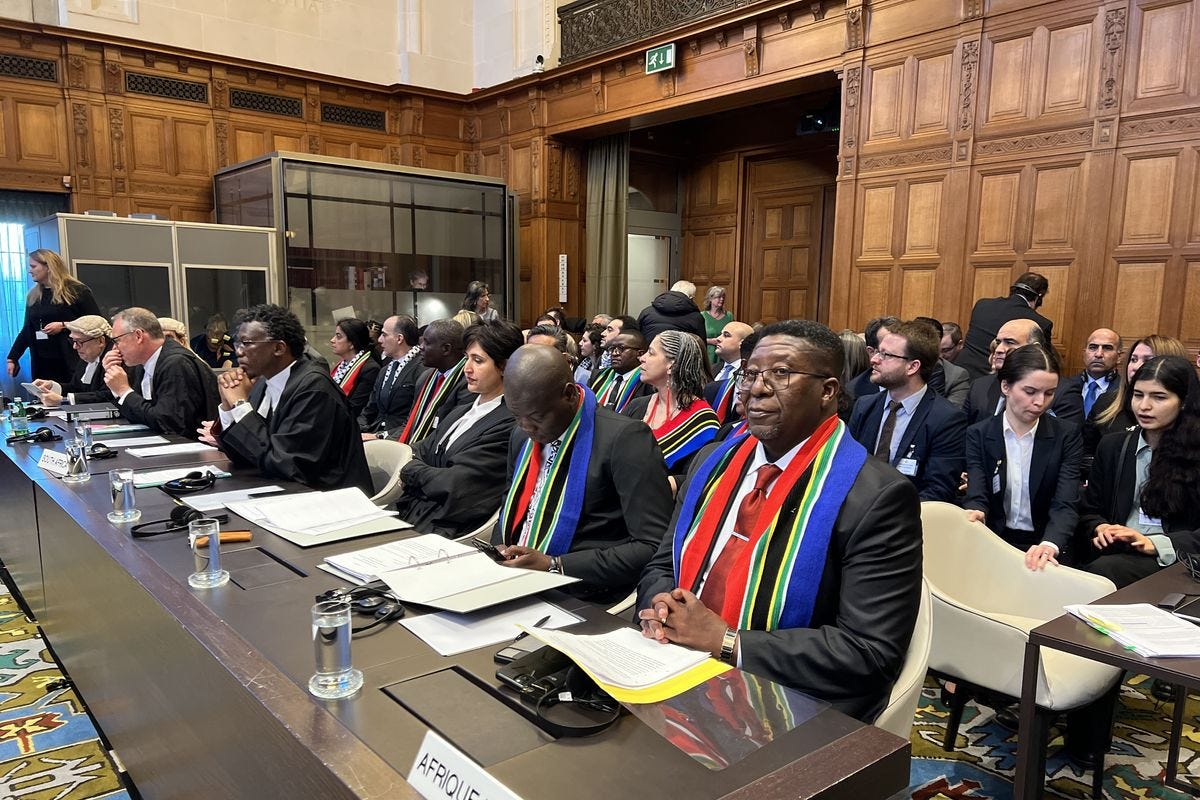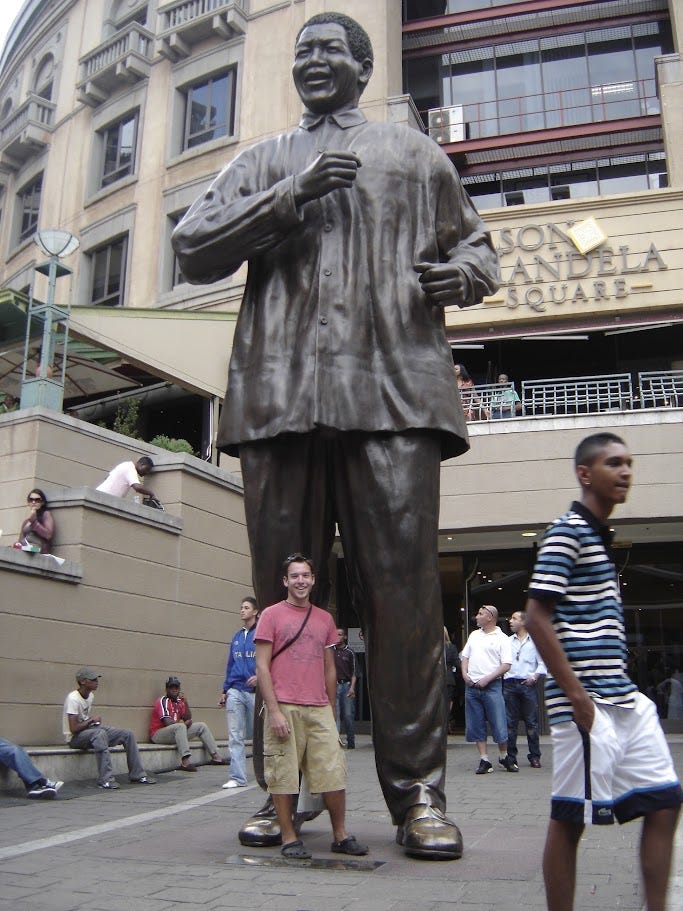The other day I was at a meeting and bumped into a South African friend. He told me that lately, when people ask him about his take on the South Africa versus Israel fracas at the International Court of Justice (ICJ), he’s just been telling people that he’s actually from Zimbabwe instead, just to get the conversation over with. To distance himself from that country that has turned on its Jews.
I laughed because that’s a pretty funny comment, but it’s even funnier that someone would suggest that being from ZIMBABWE is more appropriate at the moment than being from South Africa. That’s like a Canadian preferring to be identified as an American. Simply outrageous.
But such is life as a South African today - filled with disappointment.
Personal history
Head’s up: This post is a bit more personal than usual.
I’m South African too. I was born there but moved to Canada with my parents when I was just 15 months old. I shed my adorable accent in grade one, because the other kids just couldn’t handle how cute it was and felt compelled to make fun of me. I had to make the near-impossible transition from saying "woh-tah” to “water”, which was so difficult that when people asked me what I wanted to drink as a child, I usually asked for Coke. My dentist was less than thrilled.
Though I grew up in Canada, my home was thoroughly South African. My parents were (and probably still are, in some respects) proud South Africans and we were immersed in the dynamic community of those South African immigrants in Canada. We went to each other’s houses for Shabbat dinners, brought our traditions and food here, and filled our homes with African memories. My parents’ house today has many pieces of African artwork and crafts. And why shouldn’t it be? My parents are South African, born and raised. Three out of four of my grandparents were born there too, and they were as much a part of that country as it was of them.
I love my South African heritage. I love the way it has dictated who I am, and often how I see the world. It has made me an ardent Zionist, and my Judaism is a South African breed of Judaism. It is traditional Litvak Judaism. I’ve taken to calling South African Judaism NOOJ - Non-observant Orthodox Judaism. If you’re South African, you know what I mean.
All of this - our history, community, the practice of our Judaism, the wooden masks in our homes, the giraffes gracing our front doors - is a part of our identity, and it always made us look fondly back home, even though we left.
Today however, I’d argue that a line has been crossed. How is it possible to look back at that place with the same glimmer in our eyes? I love my South African identity, but as much as it pains me to say it, I think I hate South Africa.
South Africa today
I haven’t lived in South Africa for 37 years, and haven’t visited in 11. So I am no authority on life there today. But from what I understand, there is much to be desired.
Certainly, many South Africans have it good. One of my cousins refers to the country as “heaven in hell,” in that it’s a gorgeous country with so much to offer, set against a tragic backdrop. There is a close-knit community, affluence, beautiful weather, delicious food, and so much that makes it hard for South Africans to imagine leaving.
But the country is crumbling. The value of the currency (the Rand) has declined significantly in recent years. In major cities there is regular “loadshedding” (i.e. power cuts) because the existing power grid cannot handle the electricity demands 24/7. The country’s water infrastructure is literally falling apart, with pipes bursting and needing to be replaced, leading to water shortages and policies to limit water usage. In 2018, a national emergency was declared when Cape Town - A CITY ON THE COAST - faced becoming the first major city in the world to run out of drinkable water. (Israel, a world-leader in desalination technology, offered to help avert a major crisis. Their offer was rebuffed because the governing body of Cape Town prefers the Palestinians.)
South Africa is one of the most dangerous countries in the world with a murder rate of 75 homicides per day, or 45 homicides per 100,000. Compare that to Canada, which experienced about 900 murders last year (the same number as South Africa experiences every 12 days), or 2.25 homicides per 100,000. South Africa is also the rape capital of the world, with a reported (and frankly unbelievable) rate of 66,196 incidents per 100,000 people. That is simply insane. According to Time, “human rights organizations estimate that over 40% of South African women will be raped in their lifetime and say that only 1 in 9 rapes are reported - which is to say that the average South African woman is more likely to be raped than complete secondary school.”
So naturally, this is the country that has brought a human rights complaint against Israel at the ICJ. This country, that cannot keep its citizens safe, that cannot keep its women from being raped, this country that cannot guarantee simple water, food, and electrical security for its people, now seeks to be a light unto the nations, condemning the Middle East’s one democracy.
South Africa versus Israel
Sadly, there is a complicated history between Israel and South Africa, and it is far too complicated to detail here.
Israel was close with South Africa’s Apartheid government. They did business and sold weapons to South Africa at a time when international boycotts made it difficult for South Africa to do so. There is a history, and it must be acknowledged.
At the same time, the African National Congress (ANC), Mandela’s party, trained alongside the Palestinian Liberation Organization (PLO) in the 1960s and 70s, and saw themselves as allies, needing to overthrow the status quo in their respective realms.
The Palestinians however, under Yasser Arafat’s leadership, turned to terrorism, missing opportunity after opportunity to create a Palestinian state alongside the Jewish one. They sought to butcher and kill Jews. They prioritized the destruction of the Jewish State over the establishment of a Palestinian one.
Nelson Mandela was far more pragmatic - like, in a different league. He embraced White South Africa, forgave them for their prior sins, and endeavoured to create a “Rainbow Nation”, peacefully transitioning the ANC into power in 1994. Even with his revolutionary history however, and grassroots relationship with certain Palestinian causes, Mandela was still - I believe - a friend of Israel, and a friend of the Jews. He also certainly never forgot the Jews that struggled alongside him to overthrow the Apartheid regime.
Tragically, Mandela’s idealism and pragmatism died with him. Subsequent governments have moved away from the Jews, and have frankly embraced the jihadism of their new besties: Hamas.
In recent years, Hamas and the South African government have grown close. South Africa’s current president, Cyril Ramaphosa, came to power in 2018 with the hope that he would be a friend of the Jewish community. But that hope quickly dissipated. After 10/7, he failed to condemn the massacre, did not reach out the families of those South Africans killed and kidnapped on that day in Israel. Two weeks after the attack, clad in a keffiyeh, he blamed Israel for deserving the attack, and has allowed his government to run rampant with terror sympathizers and jihadists.
As described brilliantly by Howard Sackstein in “Is it time to go?”, South Africa’s jihadist foreign minister Naledi Pandor, and her director general, Zane Dangor, have directed South Africa’s foreign policy directly away from Israel. Embracing Hamas, declining an invitation to watch Israel’s 47-minute video of Hamas atrocities, and of course, bringing a case at the ICJ against Israel, ludicrously alleging the crime of genocide, have all been part of their diplomatic assault against the Jewish State. Ironically, a week before the accusation of genocide was brought in the ICJ, Ramaphosa hosted Muhammad Hamdan Dagalo in South Africa. Dagalo is a Sudanese warlord whose Janjaweed militia has spent 20 years perpetrating an actual genocide against Sudan’s Darfuri people. You can taste the hypocrisy.
Thus, South Africa has become Israel’s enemy. Aligned squarely with Iran, Cuba, Venezuela, and Russia (no friends of the liberal West), it has chosen to deflect from its own abysmal failures and corruption by trying to lead some kind of moral battle against the Middle East’s one and only democracy.
Utter disappointment
Even as I type these words, I find it difficult to do so. I think I hate South Africa. I hate the government which is repulsive, and the culture which is abhorrent. I hate what has become of this country that was once so good to my family, and I hate how far they have fallen from the Mandela-era optimism.
As a community whose identity is so intertwined with a place, it is difficult for the South African diaspora to see that place reject us so thoroughly. It’s strange to say that I love being South African, but hate South Africa. But the identity and the place are now two different things. Whether we yearn for a past that no longer is, or desire the things that are too hard to see in the fog of the moment, this identity is one that is increasingly difficult to reconcile.
South Africa today stands on trial, its belief that it can sacrifice its Jewish community on the altar of its own political expediency is laid bare before us.
As a community, we need some urgent dialogue about the red lines that have been crossed and whether South Africa still affords us the opportunity to live as free Jews in a society where we’re equals. Regrettably, it’s the question from which we can no longer hide.
As a community, we’ve contributed far more to South Africa than we’ve received, and if South Africa doesn’t realise that now, it will be too late.
As a South African in the diaspora, it pains me to see what has happened to that country. It upsets me that I likely will never go back, unable to ever show my wife and kids the country I was born in, and where I have so many happy memories.
Not only do I worry about family and friends who remain, but I worry that this is yet another country pushing out its Jews. A country that once had a Jewish population of 120,000 now has a population of approximately 40,000. This is a country to which El Al will no longer fly. It is a country that kicked the Jewish captain of its Under-19 cricket team, David Teeger, out of his position because of his Judaism and Zionism. It is a country that has welcomed Hamas (I guess they’re delighted by the rape culture), and that has shunned the Israelis. I fear that it increasingly appears that for South Africa’s Jews, to quote Timon and Pumbaa, “Disaster’s in the air.”
The last verse of South Africa’s national anthem (Nkosi Sikelel’ Afrika - God bless Africa), is:
Sounds the call to come together,
And united we shall stand.
Let us live and strive for freedom,
In South Africa, our land.
South Africa has retreated from its aspirations to come together as a rainbow nation. When a place shuns and persecutes its Jews, it is impossible to speak of unity. When one abandons liberal democracy, and embraces the enemies of the West, you no longer strive for freedom, but rather for power.
Sadly, as Jews, South Africa may no longer be our land.









Heartbreaking.